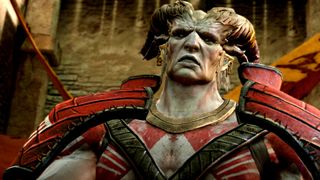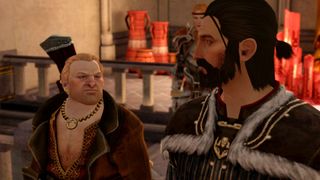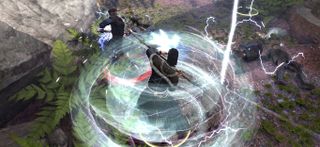Returning to Bioware's most divisive RPG: Dragon Age 2
Reinstall.

Reinstall invites you to join us in revisiting PC gaming days gone by. Here, Chris examines the highs and lows of Bioware's most divisive RPG.
It begins, as RPGs often do, with a family tragedy and a burning village. In the aftermath of the destruction of Lothering, a mage, warrior, or rogue called Hawke escapes into the wilderness with his or her family: mother, brother, sister, and (if you installed the right preorder DLC) their dog. In Dragon Age: Origins, you left Lothering behind shortly before its destruction, heading off on your quest to unite the kingdom and end the darkspawn threat. Here, you see a different side of those events, rendered in a way that establishes a fundamental change in the series’ creative direction. The darkspawn have been redesigned; Ferelden reimagined as a terracotta wasteland; Flemeth transformed from ‘old lady in a swamp’ into ‘fortune-teller dominatrix’ (she also transforms into a dragon, but that’s another matter).
Yet even in these rough early moments, there are glimmers of the diamonds to be found. The Hawke family speak to each other like people, and the introduction of voice acting for the protagonist allows you to immediately establish whether your Hawke is supportive, aggressive, or flippant in the face of danger. When one of the Hawke siblings is killed, their death is abrupt and the reaction to it well-performed. When the Hawkes encounter a wounded Templar and his warrior wife, their fate is similarly grounded.

The experience of beginning Dragon Age 2 is of encountering a world that has grown smaller and uglier, populated by characters who have gained depth and personality. It is likewise a game that comes draped in all of the worst trappings of last-gen EA (empty, streamlined combat; pre-order dogs), but takes an unorthodox approach to BioWare storytelling, with a framing narrative and three-act structure that defies the expectations of veteran players—for better and for worse.
This begins with the notion that Hawke is never entirely free of responsibility. After the death of one of your siblings (which one depends on the class you chose at character creation), the need to keep the surviving family together intensifies. You flee to Kirkwall, your mother's birthplace, and take mercenary contracts to pay off your deadbeat uncle's debts and gain entry to the city.
The first act is spent trying to scrape enough money together to fund an expedition that might lift the family out of poverty. You contend with your mother's disappointment, and, if she survives, your mage sister's need to stay hidden from the magic-policing Templars that hold power in the city. If you yourself are a mage, you must deal with something pettier: your little brother's anger at living in your shadow, his lack of purpose and desire to chart his own course through life.
These are novelistic flourishes, not epic ones. Dragon Age 2's greatest strength is the way it concerns itself with believable people, and the way it is comfortable telling stories about things that might not threaten the safety of the world but are very important to the people experiencing them. The result is a narrative that you will either find incredibly compelling or utterly lacking in drive—this is a game that you either fall in love with to the exclusion of its faults or slink away from, disappointed.

Dragon Age 2's roster of companions are not indentured servants who bind themselves to Hawke's service forever, as Shepard's friends do—they have their own homes, jobs, and opinions. They also have complex relationships with each other. Their rivalries and affections are brilliantly presented through incidental dialogues that occur as you move around the world—if you didn't click with Dragon Age 2 the first time around, try walking between destinations rather than using the world map to skip about. Many of its best conversations only occur when you're on the move, whether Isabella's ceaseless teasing of Aveline, Varric's subtle protectiveness of Merrill, or Fenris and Anders' sniping.
PC Gamer Newsletter
Sign up to get the best content of the week, and great gaming deals, as picked by the editors.
I smile when I play this game because of the moments of character that, for me, define it: Varric's choice of nicknames for everyone (except Aveline); Isabella calling Merrill "kitten"; Anders' sense of humour surfacing above the broody spirit of vengeance that inhabits him.
Your decade in Kirkwall is an exploration of these relationships, with many highlights—finding a husband for Aveline, Isabella's betrayal and return (or not), introducing Merrill to civilisation, Anders' final, tragic, explosive expression of his frustration at the treatment of mages. BioWare has not created a narrative with this much nuance since, nor so many clever moments—like when an innocuous murder-mystery sidequest grows and grows until it becomes a very real, very tense race to save the life of a loved one.
Yet this is a game with crippling flaws. The extensive reuse of a limited pool of environments was unforgivable at the time and has aged worse. Combat is dreadful, with extensive padding and AI so bad it doesn’t matter whether you're fighting smugglers or spiders, because you press the same buttons. This game that does so much to make you believe in these people and their situation squanders any attempt to realise that fiction within its game systems or environment. "Ludonarrative dissonance" would be the polite way to put it. "Disastrously sub-par as a game" would be the other.
Dragon Age 2 is a reddish-brown city you'll never remember, occupied by people you'll never forget, and it is—as such—quite a lot like going to university. It's a distinct and characterful voice applied to a familiar set of ideas, and a paean to the notion these games have always been about personality first, game second. It could have been so much better, and yet, in its own way, it has yet to be bettered.
Joining in 2011, Chris made his start with PC Gamer turning beautiful trees into magazines, first as a writer and later as deputy editor. Once PCG's reluctant MMO champion , his discovery of Dota 2 in 2012 led him to much darker, stranger places. In 2015, Chris became the editor of PC Gamer Pro, overseeing our online coverage of competitive gaming and esports. He left in 2017, and can be now found making games and recording the Crate & Crowbar podcast.
Most Popular


